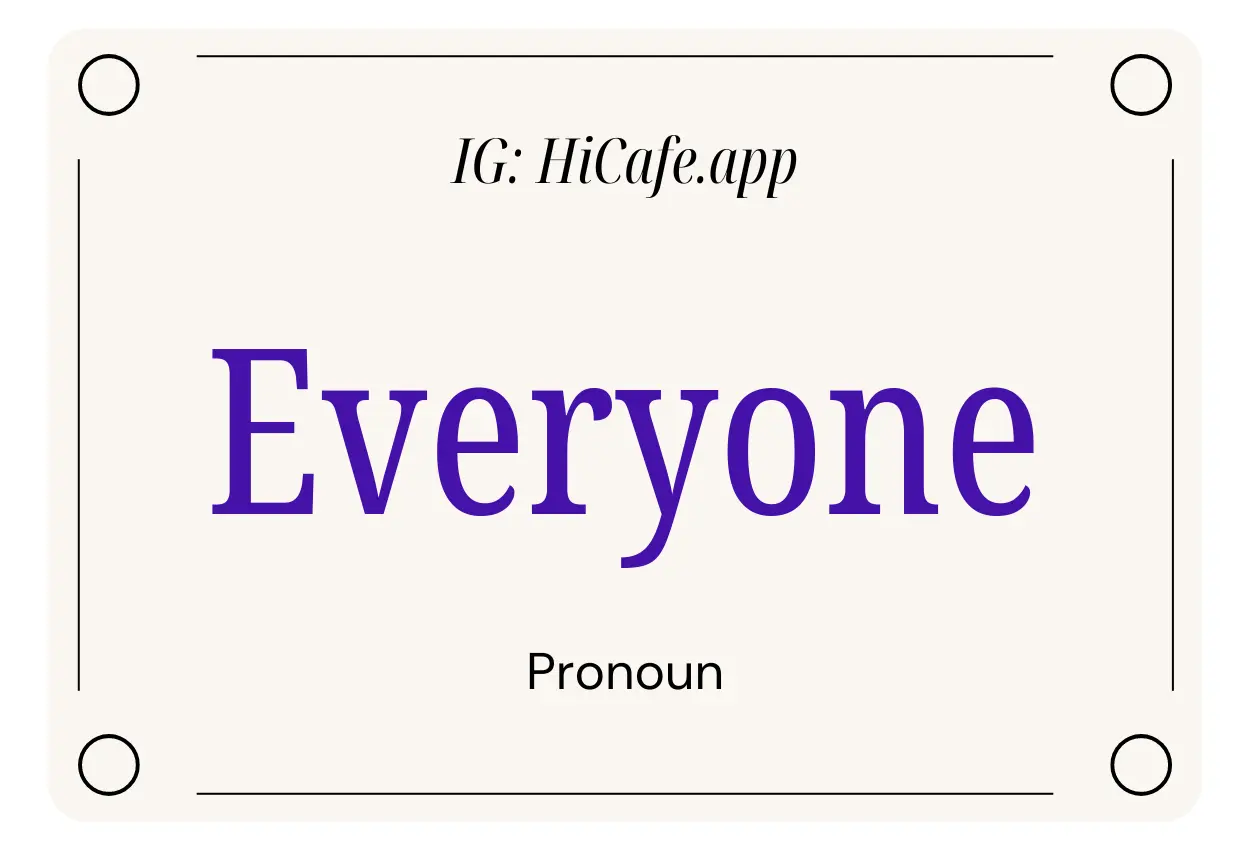Grammar Pronoun- Lesson 11- What Type of Pronoun Is Everyone
In this grammar lesson, you learn about what type of pronoun is Everyone in English and how to use Everyone in your English conversation and writing. Just follow examples and write them down a few times to learn them very well. After finishing this lesson, you should work on its quiz.
Grammar Recap
In our previous lesson, we covered the Who Pronoun Grammar If you just landed on this page, we suggest that you complete our previous lesson including its quizzes before continuing on this lesson.
Requirement Lessons
There is no required lessons for working and learning this lesson.
Everybody and Everyone is What Type of Pronoun
(indefinite pronouns)
singular
| subject | object | possessive adjective | possessive pronoun | reflexive pronoun |
|---|---|---|---|---|
|
everyone everybody
|
everyone everybody |
everyone’s everybody’s
|
everyone’s everybody’s
|
X
|
Use “everyone” or “everybody” when talking about each and every person in a group. This is similar in meaning to the word “all”; however, this word is singular–it’s not plural.
subject = everyone or everybody
Everybody is here.
Does everyone have a seat on the bus?
This pronoun is singular even though it is used when talking to or about a group of people.
everyone / everybody
object = everyone or everybody
The teacher spoke to everybody.
Airport officials check everybody who goes through security.
whom = Anna
She spoke to everybody.
possessive adjective = everyone’s or everybody’s
Everyone’s seat belt is on.
It’s everybody’s responsibility to remain seated until the ride is over.
Everyone’s safety belt is tight.
possessive pronoun = everyone’s or everybody’s
A: Whose park is this?
B: It’s everyone’s.
It’s everyone’s to enjoy.
reflexive pronoun = 0
When referring back to the subject, the grammatically best solution is to use “himself or herself.” While this may sound awkward, it’s an acceptable alternative to “themselves” which is commonly used by Americans. (Everyone has to do this by themselves.)
There are a few important things to consider when using these pronouns:
1. We often use the word “everyone” (or “everybody”) when exaggerating or when we mean to say “a lot of people” or “many people.” For example….
Jefferson Park in Chicago is a popular destination for tourists. Everyone goes there. (Well, not everyone, but many people go there.)
Everyone had a good time at the party. (Actually, one or two people had a terrible time.)
Everybody loves this music. (No, not everyone, but many people do.)
2. In the present tense, ‘s is often used as a contraction for “is” and “has”:
Everyone’s here. (Everyone is…)
Everybody’s having a good time. (Everybody is…)
Do you think everyone’s had enough to eat? (…everyone has had…)
Everybody’s got to go. (Everybody has got…)
3. When “everyone” is an antecedent, many people use “his or her” because there is no gender neutral singular pronoun in English. The alternative is to use a plural pronoun, which is what many Americans do:
Everyone has his or her own book. (correct)
Everyone has their own book. (incorrect, but many people find this usage acceptable.)
I couldn’t find my name on the list, but everyone else found theirs. (incorrect grammatically but still okay. To say “his or hers” sounds too correct.)
. . . . . . . . . . . . . . . . . . . . . . . . . . . . . . . . . . . .
Exercise 11
Fill in the blanks with….
everyone everyone’s his or her
1. _________ late.
2. Do you know _________ here?
3. I’m not sure if __________ here.
4. This park belongs to __________.
5. Everyone needs to concentrate on ___________ own work.
6. T-shirts were given to ________ who walked into the stadium.
7. Food was on __________ mind before lunch.
8. Okay, __________. Let’s go.
9. Are you sure _________ on the bus?
10. Everyone paid for _________ own lunch.
Answers: 1. Everyone’s; 2. everyone; 3. everyone’s; 4. everyone; 5. his or her; 6. everyone; 7. everyone’s; 8. everyone; 9. everyone’s; 10. his or her
Private Lessons in English
If you need help with quizzes of this lesson, you can hire one of our expert private English teachers by going to our Private English Tutoring page and submit a request. When submitting your request, make sure to mention the grammar level and lesson number.
Next Grammar Lesson
In our next lesson, we will cover the Someone Pronoun Definition Before moving to the next lesson, we suggest that you complete this lesson including its quizzes.
Related Grammar Lessons
None
Grammar Pronoun Outline
If you wish to explore all lessons that are covered in HiCafe Grammar Pronoun, you can visit the Review of English Pronoun Words page.
Practice English Grammar Skills
For a comprehensive practice of English grammar with quizzes, you can visit the Improve English Grammar Skills page to view HiCafe 250 grammar lessons in 7 levels plus prepositions and pronouns.
